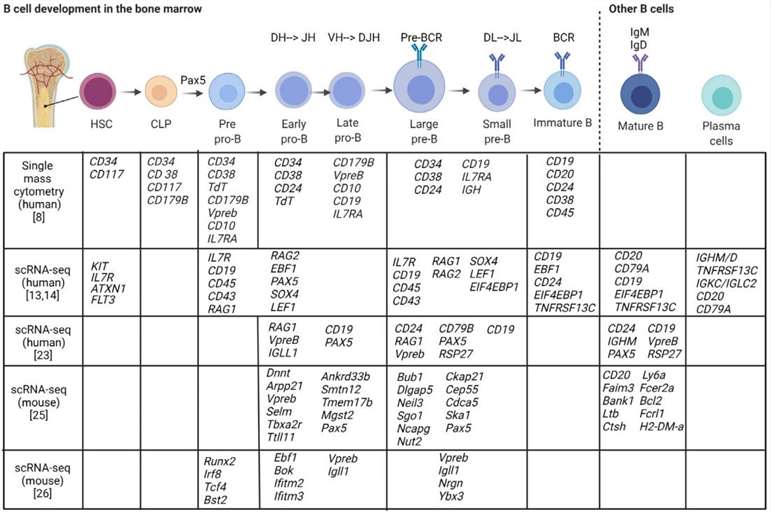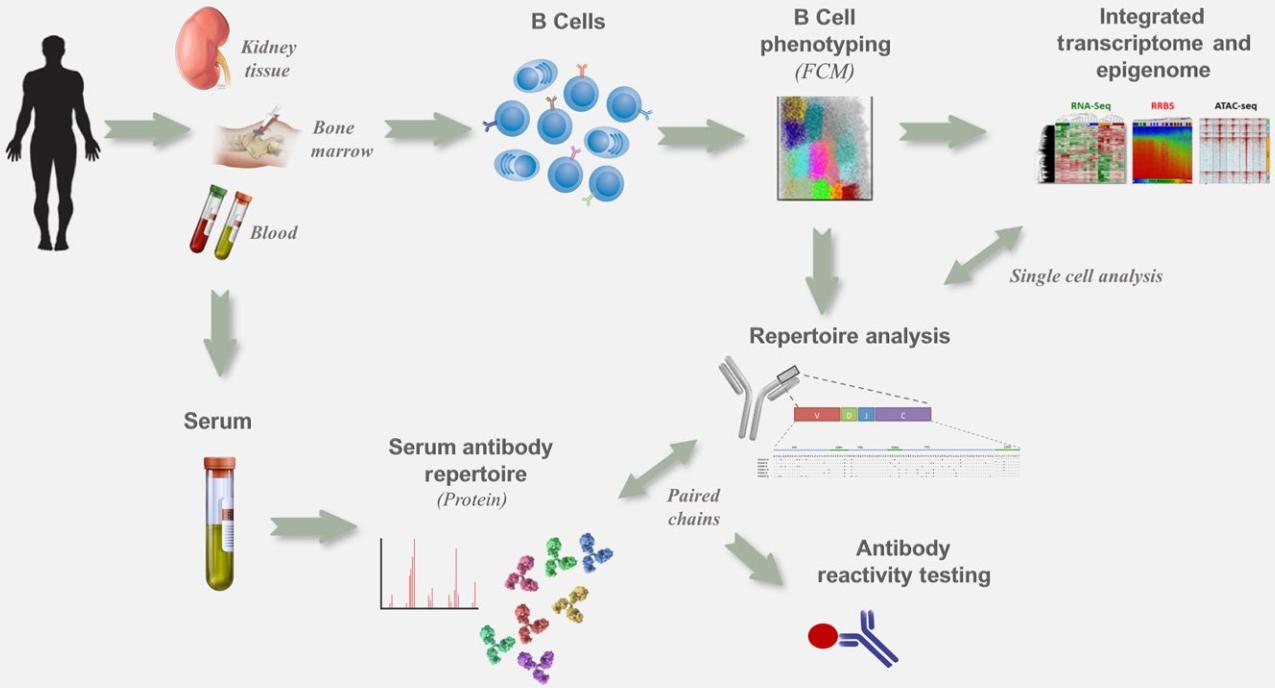Immunomics Services
Immunomics Services for B Cells
B lymphocytes, also called B cells, are a subset of adaptive immune cells that begin to mature in the fetal liver and the bone marrow after birth. B cells are known for their ability to support humoral immunity through antibody production, but they also have other key functions such as phagocytosis and antigen presentation. CD Genomics is dedicated to the immunomics study of B cells, which helps our clients to understand the B cell lineage, as well as the maturation and differentiation of B cells in the process.
Introduction to B Cells
B lymphocytes are stimulated by antigens and proliferate and differentiate into large numbers of plasma cells. Plasma cells synthesize and secrete antibodies and circulate in the bloodstream. Most B cells that perform functions survive in vivo for a short period of time, a few days to a few weeks, but their memory cells can survive for a long time in vivo. B cells are also a heterogeneous population, displaying different functions and surface markers.
Development of B Cells
B cell development involves a tightly regulated multi-step process. Understanding the normal B-cell developmental program to detect early perturbations that may lead to disease is critical. A scRNA-seq-based study demonstrates the respective B-cell differentiation transcriptome atlas, delineating trajectories and organizing differentially expressed genes into signaling and regulatory pathways that can be used to further elucidate the mechanisms of differentiation.
 Fig.1 B cell gene signatures in the bone marrow. (Morgan, D., & Tergaonkar, V., 2022)
Fig.1 B cell gene signatures in the bone marrow. (Morgan, D., & Tergaonkar, V., 2022)
Applications of B Cell Immunomics
Immunomics studies of B cells, particularly those targeting the characteristics and fate of specific B cells, are essential for identifying the underlying mechanisms of multiple diseases. In addition, a comprehensive understanding of the antibody library expressed by B cells and plasma cells (PCs) with different functional properties and lifespans is essential for the development of new therapeutic strategies, better biomarkers for disease classification, and new assays to measure the recovery of B cell tolerance.
- B Cell Immunomics Study of SLE Patients
Disruption of B cell tolerance and aberrant activation are key steps leading to the initiation of the systemic lupus erythematosus (SLE) cascade response. Human B cell activation, differentiation, and self-tolerance in SLE are investigated using immunoassays and library sequencing. The experiments have revealed that newly activated B cells with a general naive B cell phenotype are continuously recruited during SLE exacerbations, possibly through extra-follicular pathways and/or early germinal center (GC) responses.
 Fig.2 Project workflow. (Tipton, C. M., et al., 2018)
Fig.2 Project workflow. (Tipton, C. M., et al., 2018)
Our Services
Immunomics studies of B cells play a key role in understanding the complex mechanisms that control the diversity and specificity of adaptive immune responses. CD Genomics offers immunomics studies of B cells that help to elucidate the functional state of adaptive immune complexes and the specificity of their responses, for example to pathogens or tumor antigens, which may become important features in the diagnosis and treatment of immune-mediated diseases.
- BCR Repertoire Analysis Services - We help our clients understand and define BCR libraries, revealing complex B-cell structures that provide the basis for the pathogenesis and treatment of a wide range of diseases.
- Epigenomics Analysis for B Cells - CD Genomics offers services in epigenomics analysis to help clients characterize new B-cell populations and classify cell populations with different differentiation pathways.
- Transcriptomics Analysis for B Cells - CD Genomics helps clients perform transcriptomic studies to validate the identity and activation pathways of predefined subpopulations with different functional properties.
- B-Cell Protein Profiling by CyTOF - We offer single-cell proteomics services for B cells to help our clients discover new cell populations and biomarkers.
Based on years of immunomics research, CD Genomics helps you explore B-cell classes of interest and discover and identify novel biomarkers for clinical diagnosis of disease and therapy development. Please contact us for more information.
References
- Morgan, D., & Tergaonkar, V. (2022). Unraveling B cell trajectories at single cell resolution. Trends in Immunology.
- Tipton, C. M., Hom, J. R., Fucile, C. F., Rosenberg, A. F., & Sanz, I. (2018). Understanding B‐cell activation and autoantibody repertoire selection in systemic lupus erythematosus: AB‐cell immunomics approach. Immunological reviews, 284(1), 120-131.
